Staying at Home is the Best Way to Manage Corona Virus
VerifiedAdded on 2022/07/27
|9
|2674
|21
AI Summary
Research Paper: The research paper is a 2000 word essay in which you take a persuasive stance on a topic and make a compelling argument. You will utilize a minimum of five sources, and your job will be to craft a compelling and fair argument that synthesizes and thoughtfully incorporates your research findings. Regardless of what structural pattern or combination you use, your persuasive essay needs: A strong thesis at the end of the introduction An acknowledgment of the opposing view(s) and a rebuttal (where you fairly acknowledge other views exist but explain why your perspective is more convincing) Useful and appropriate inclusion of source material through quotes and paraphrases
Contribute Materials
Your contribution can guide someone’s learning journey. Share your
documents today.
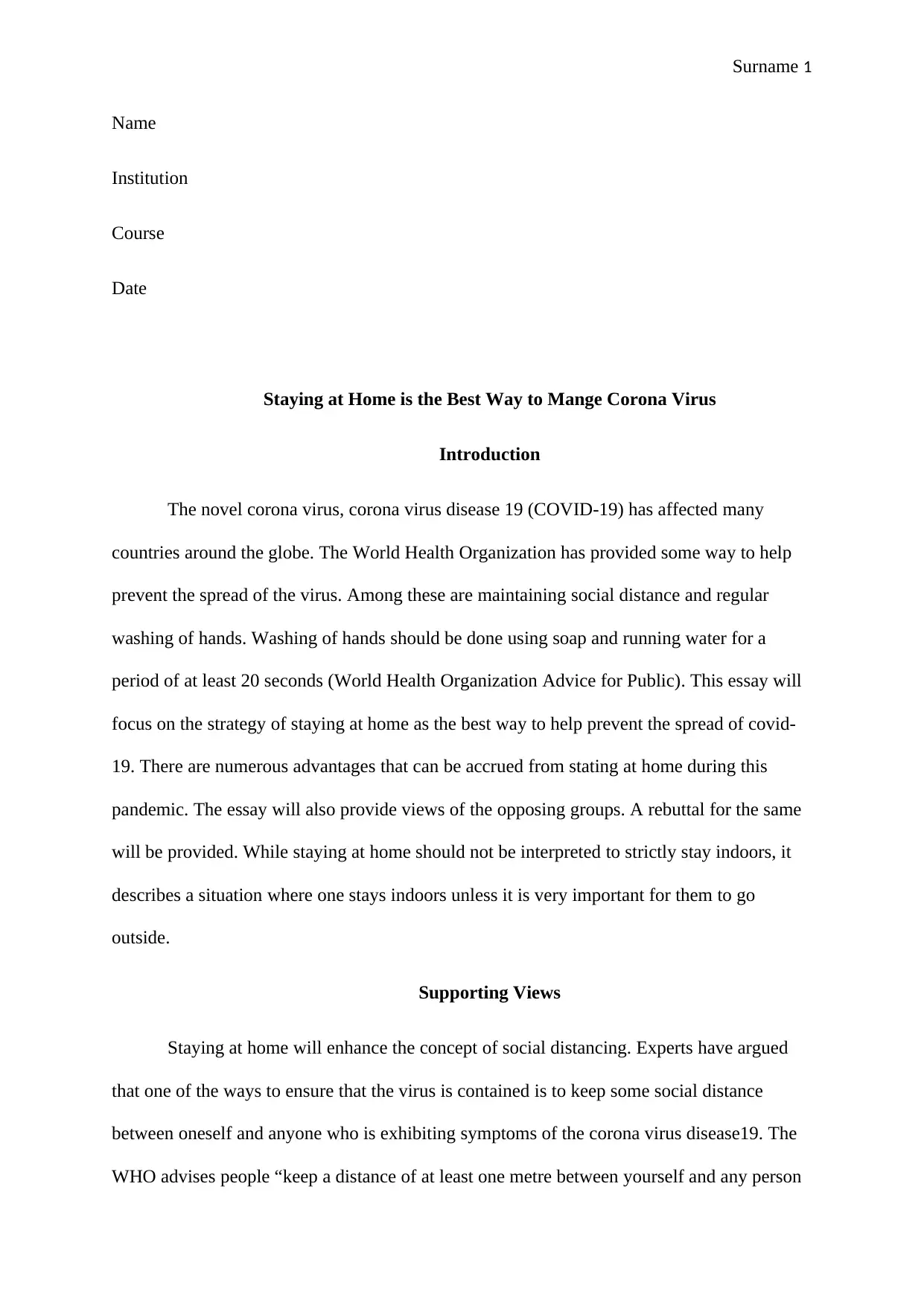
Surname 1
Name
Institution
Course
Date
Staying at Home is the Best Way to Mange Corona Virus
Introduction
The novel corona virus, corona virus disease 19 (COVID-19) has affected many
countries around the globe. The World Health Organization has provided some way to help
prevent the spread of the virus. Among these are maintaining social distance and regular
washing of hands. Washing of hands should be done using soap and running water for a
period of at least 20 seconds (World Health Organization Advice for Public). This essay will
focus on the strategy of staying at home as the best way to help prevent the spread of covid-
19. There are numerous advantages that can be accrued from stating at home during this
pandemic. The essay will also provide views of the opposing groups. A rebuttal for the same
will be provided. While staying at home should not be interpreted to strictly stay indoors, it
describes a situation where one stays indoors unless it is very important for them to go
outside.
Supporting Views
Staying at home will enhance the concept of social distancing. Experts have argued
that one of the ways to ensure that the virus is contained is to keep some social distance
between oneself and anyone who is exhibiting symptoms of the corona virus disease19. The
WHO advises people “keep a distance of at least one metre between yourself and any person
Name
Institution
Course
Date
Staying at Home is the Best Way to Mange Corona Virus
Introduction
The novel corona virus, corona virus disease 19 (COVID-19) has affected many
countries around the globe. The World Health Organization has provided some way to help
prevent the spread of the virus. Among these are maintaining social distance and regular
washing of hands. Washing of hands should be done using soap and running water for a
period of at least 20 seconds (World Health Organization Advice for Public). This essay will
focus on the strategy of staying at home as the best way to help prevent the spread of covid-
19. There are numerous advantages that can be accrued from stating at home during this
pandemic. The essay will also provide views of the opposing groups. A rebuttal for the same
will be provided. While staying at home should not be interpreted to strictly stay indoors, it
describes a situation where one stays indoors unless it is very important for them to go
outside.
Supporting Views
Staying at home will enhance the concept of social distancing. Experts have argued
that one of the ways to ensure that the virus is contained is to keep some social distance
between oneself and anyone who is exhibiting symptoms of the corona virus disease19. The
WHO advises people “keep a distance of at least one metre between yourself and any person
Secure Best Marks with AI Grader
Need help grading? Try our AI Grader for instant feedback on your assignments.
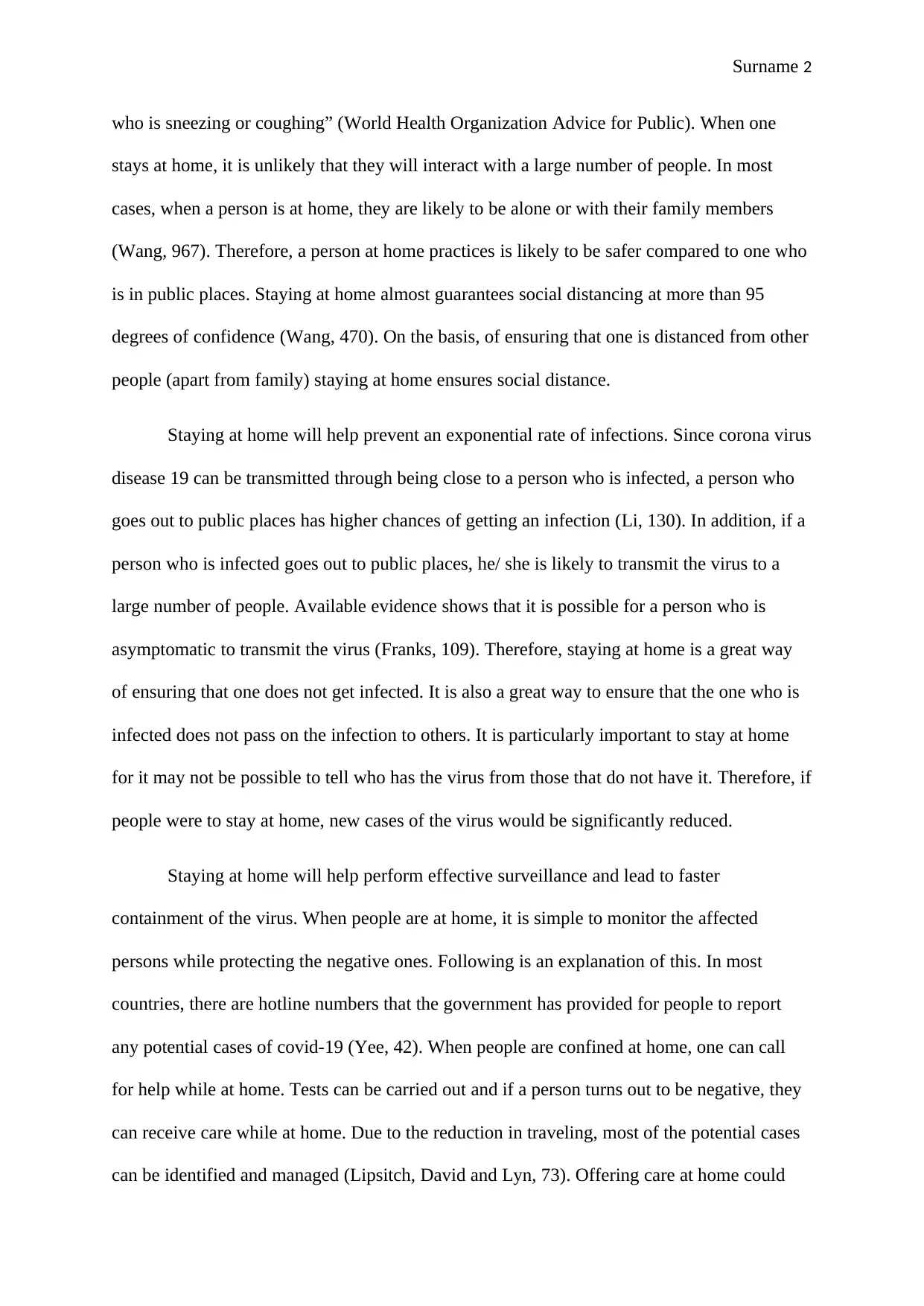
Surname 2
who is sneezing or coughing” (World Health Organization Advice for Public). When one
stays at home, it is unlikely that they will interact with a large number of people. In most
cases, when a person is at home, they are likely to be alone or with their family members
(Wang, 967). Therefore, a person at home practices is likely to be safer compared to one who
is in public places. Staying at home almost guarantees social distancing at more than 95
degrees of confidence (Wang, 470). On the basis, of ensuring that one is distanced from other
people (apart from family) staying at home ensures social distance.
Staying at home will help prevent an exponential rate of infections. Since corona virus
disease 19 can be transmitted through being close to a person who is infected, a person who
goes out to public places has higher chances of getting an infection (Li, 130). In addition, if a
person who is infected goes out to public places, he/ she is likely to transmit the virus to a
large number of people. Available evidence shows that it is possible for a person who is
asymptomatic to transmit the virus (Franks, 109). Therefore, staying at home is a great way
of ensuring that one does not get infected. It is also a great way to ensure that the one who is
infected does not pass on the infection to others. It is particularly important to stay at home
for it may not be possible to tell who has the virus from those that do not have it. Therefore, if
people were to stay at home, new cases of the virus would be significantly reduced.
Staying at home will help perform effective surveillance and lead to faster
containment of the virus. When people are at home, it is simple to monitor the affected
persons while protecting the negative ones. Following is an explanation of this. In most
countries, there are hotline numbers that the government has provided for people to report
any potential cases of covid-19 (Yee, 42). When people are confined at home, one can call
for help while at home. Tests can be carried out and if a person turns out to be negative, they
can receive care while at home. Due to the reduction in traveling, most of the potential cases
can be identified and managed (Lipsitch, David and Lyn, 73). Offering care at home could
who is sneezing or coughing” (World Health Organization Advice for Public). When one
stays at home, it is unlikely that they will interact with a large number of people. In most
cases, when a person is at home, they are likely to be alone or with their family members
(Wang, 967). Therefore, a person at home practices is likely to be safer compared to one who
is in public places. Staying at home almost guarantees social distancing at more than 95
degrees of confidence (Wang, 470). On the basis, of ensuring that one is distanced from other
people (apart from family) staying at home ensures social distance.
Staying at home will help prevent an exponential rate of infections. Since corona virus
disease 19 can be transmitted through being close to a person who is infected, a person who
goes out to public places has higher chances of getting an infection (Li, 130). In addition, if a
person who is infected goes out to public places, he/ she is likely to transmit the virus to a
large number of people. Available evidence shows that it is possible for a person who is
asymptomatic to transmit the virus (Franks, 109). Therefore, staying at home is a great way
of ensuring that one does not get infected. It is also a great way to ensure that the one who is
infected does not pass on the infection to others. It is particularly important to stay at home
for it may not be possible to tell who has the virus from those that do not have it. Therefore, if
people were to stay at home, new cases of the virus would be significantly reduced.
Staying at home will help perform effective surveillance and lead to faster
containment of the virus. When people are at home, it is simple to monitor the affected
persons while protecting the negative ones. Following is an explanation of this. In most
countries, there are hotline numbers that the government has provided for people to report
any potential cases of covid-19 (Yee, 42). When people are confined at home, one can call
for help while at home. Tests can be carried out and if a person turns out to be negative, they
can receive care while at home. Due to the reduction in traveling, most of the potential cases
can be identified and managed (Lipsitch, David and Lyn, 73). Offering care at home could
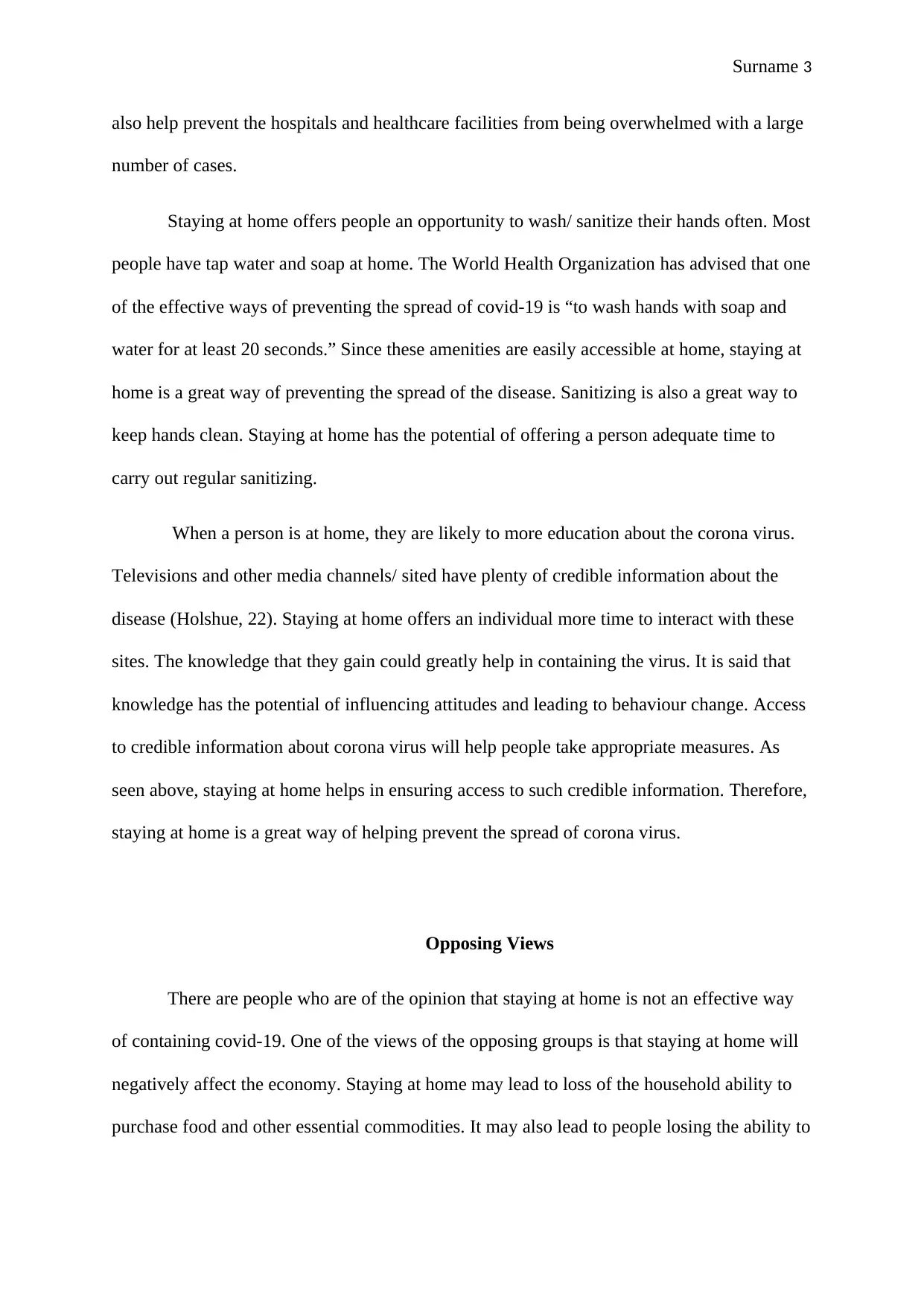
Surname 3
also help prevent the hospitals and healthcare facilities from being overwhelmed with a large
number of cases.
Staying at home offers people an opportunity to wash/ sanitize their hands often. Most
people have tap water and soap at home. The World Health Organization has advised that one
of the effective ways of preventing the spread of covid-19 is “to wash hands with soap and
water for at least 20 seconds.” Since these amenities are easily accessible at home, staying at
home is a great way of preventing the spread of the disease. Sanitizing is also a great way to
keep hands clean. Staying at home has the potential of offering a person adequate time to
carry out regular sanitizing.
When a person is at home, they are likely to more education about the corona virus.
Televisions and other media channels/ sited have plenty of credible information about the
disease (Holshue, 22). Staying at home offers an individual more time to interact with these
sites. The knowledge that they gain could greatly help in containing the virus. It is said that
knowledge has the potential of influencing attitudes and leading to behaviour change. Access
to credible information about corona virus will help people take appropriate measures. As
seen above, staying at home helps in ensuring access to such credible information. Therefore,
staying at home is a great way of helping prevent the spread of corona virus.
Opposing Views
There are people who are of the opinion that staying at home is not an effective way
of containing covid-19. One of the views of the opposing groups is that staying at home will
negatively affect the economy. Staying at home may lead to loss of the household ability to
purchase food and other essential commodities. It may also lead to people losing the ability to
also help prevent the hospitals and healthcare facilities from being overwhelmed with a large
number of cases.
Staying at home offers people an opportunity to wash/ sanitize their hands often. Most
people have tap water and soap at home. The World Health Organization has advised that one
of the effective ways of preventing the spread of covid-19 is “to wash hands with soap and
water for at least 20 seconds.” Since these amenities are easily accessible at home, staying at
home is a great way of preventing the spread of the disease. Sanitizing is also a great way to
keep hands clean. Staying at home has the potential of offering a person adequate time to
carry out regular sanitizing.
When a person is at home, they are likely to more education about the corona virus.
Televisions and other media channels/ sited have plenty of credible information about the
disease (Holshue, 22). Staying at home offers an individual more time to interact with these
sites. The knowledge that they gain could greatly help in containing the virus. It is said that
knowledge has the potential of influencing attitudes and leading to behaviour change. Access
to credible information about corona virus will help people take appropriate measures. As
seen above, staying at home helps in ensuring access to such credible information. Therefore,
staying at home is a great way of helping prevent the spread of corona virus.
Opposing Views
There are people who are of the opinion that staying at home is not an effective way
of containing covid-19. One of the views of the opposing groups is that staying at home will
negatively affect the economy. Staying at home may lead to loss of the household ability to
purchase food and other essential commodities. It may also lead to people losing the ability to
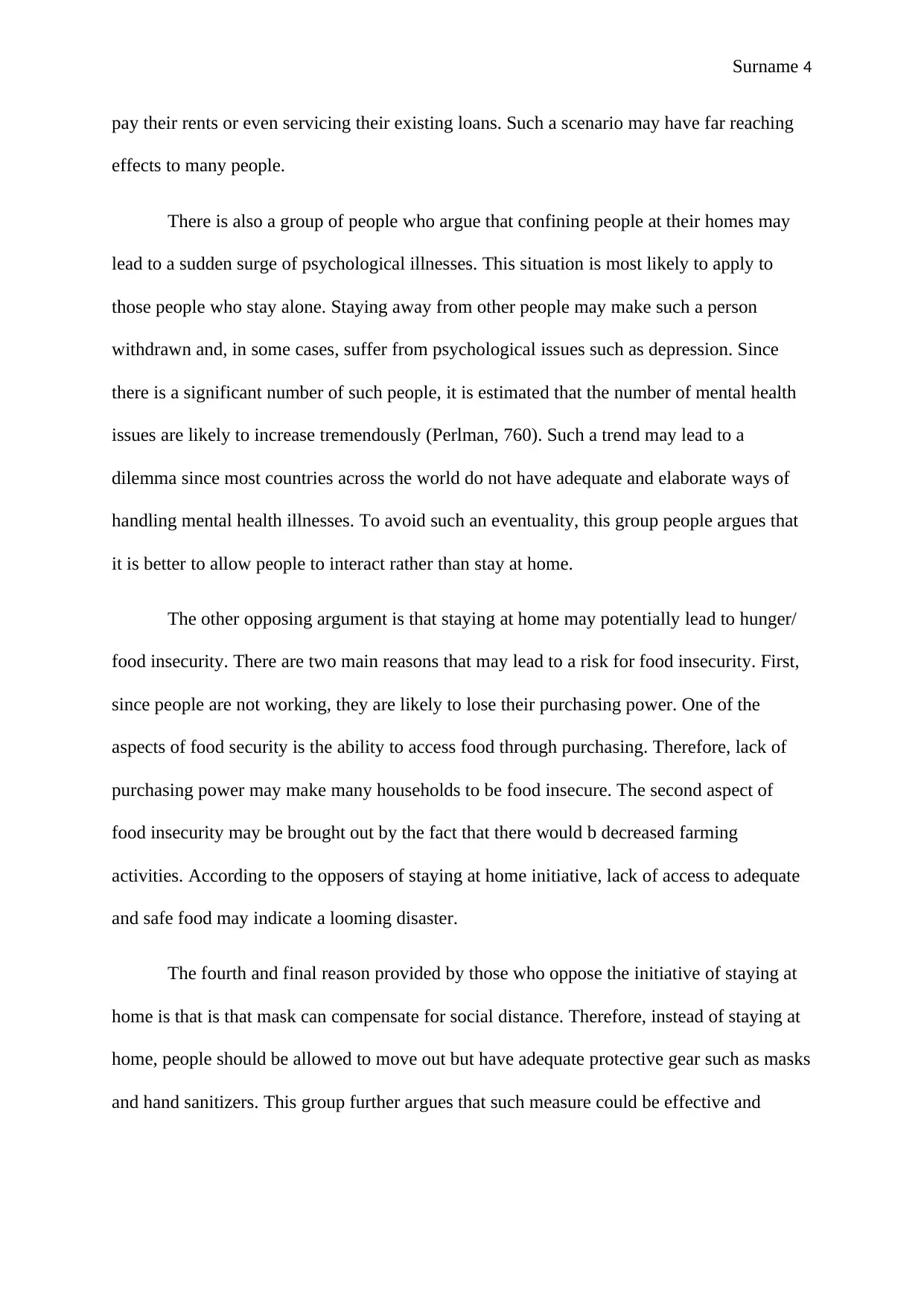
Surname 4
pay their rents or even servicing their existing loans. Such a scenario may have far reaching
effects to many people.
There is also a group of people who argue that confining people at their homes may
lead to a sudden surge of psychological illnesses. This situation is most likely to apply to
those people who stay alone. Staying away from other people may make such a person
withdrawn and, in some cases, suffer from psychological issues such as depression. Since
there is a significant number of such people, it is estimated that the number of mental health
issues are likely to increase tremendously (Perlman, 760). Such a trend may lead to a
dilemma since most countries across the world do not have adequate and elaborate ways of
handling mental health illnesses. To avoid such an eventuality, this group people argues that
it is better to allow people to interact rather than stay at home.
The other opposing argument is that staying at home may potentially lead to hunger/
food insecurity. There are two main reasons that may lead to a risk for food insecurity. First,
since people are not working, they are likely to lose their purchasing power. One of the
aspects of food security is the ability to access food through purchasing. Therefore, lack of
purchasing power may make many households to be food insecure. The second aspect of
food insecurity may be brought out by the fact that there would b decreased farming
activities. According to the opposers of staying at home initiative, lack of access to adequate
and safe food may indicate a looming disaster.
The fourth and final reason provided by those who oppose the initiative of staying at
home is that is that mask can compensate for social distance. Therefore, instead of staying at
home, people should be allowed to move out but have adequate protective gear such as masks
and hand sanitizers. This group further argues that such measure could be effective and
pay their rents or even servicing their existing loans. Such a scenario may have far reaching
effects to many people.
There is also a group of people who argue that confining people at their homes may
lead to a sudden surge of psychological illnesses. This situation is most likely to apply to
those people who stay alone. Staying away from other people may make such a person
withdrawn and, in some cases, suffer from psychological issues such as depression. Since
there is a significant number of such people, it is estimated that the number of mental health
issues are likely to increase tremendously (Perlman, 760). Such a trend may lead to a
dilemma since most countries across the world do not have adequate and elaborate ways of
handling mental health illnesses. To avoid such an eventuality, this group people argues that
it is better to allow people to interact rather than stay at home.
The other opposing argument is that staying at home may potentially lead to hunger/
food insecurity. There are two main reasons that may lead to a risk for food insecurity. First,
since people are not working, they are likely to lose their purchasing power. One of the
aspects of food security is the ability to access food through purchasing. Therefore, lack of
purchasing power may make many households to be food insecure. The second aspect of
food insecurity may be brought out by the fact that there would b decreased farming
activities. According to the opposers of staying at home initiative, lack of access to adequate
and safe food may indicate a looming disaster.
The fourth and final reason provided by those who oppose the initiative of staying at
home is that is that mask can compensate for social distance. Therefore, instead of staying at
home, people should be allowed to move out but have adequate protective gear such as masks
and hand sanitizers. This group further argues that such measure could be effective and
Secure Best Marks with AI Grader
Need help grading? Try our AI Grader for instant feedback on your assignments.
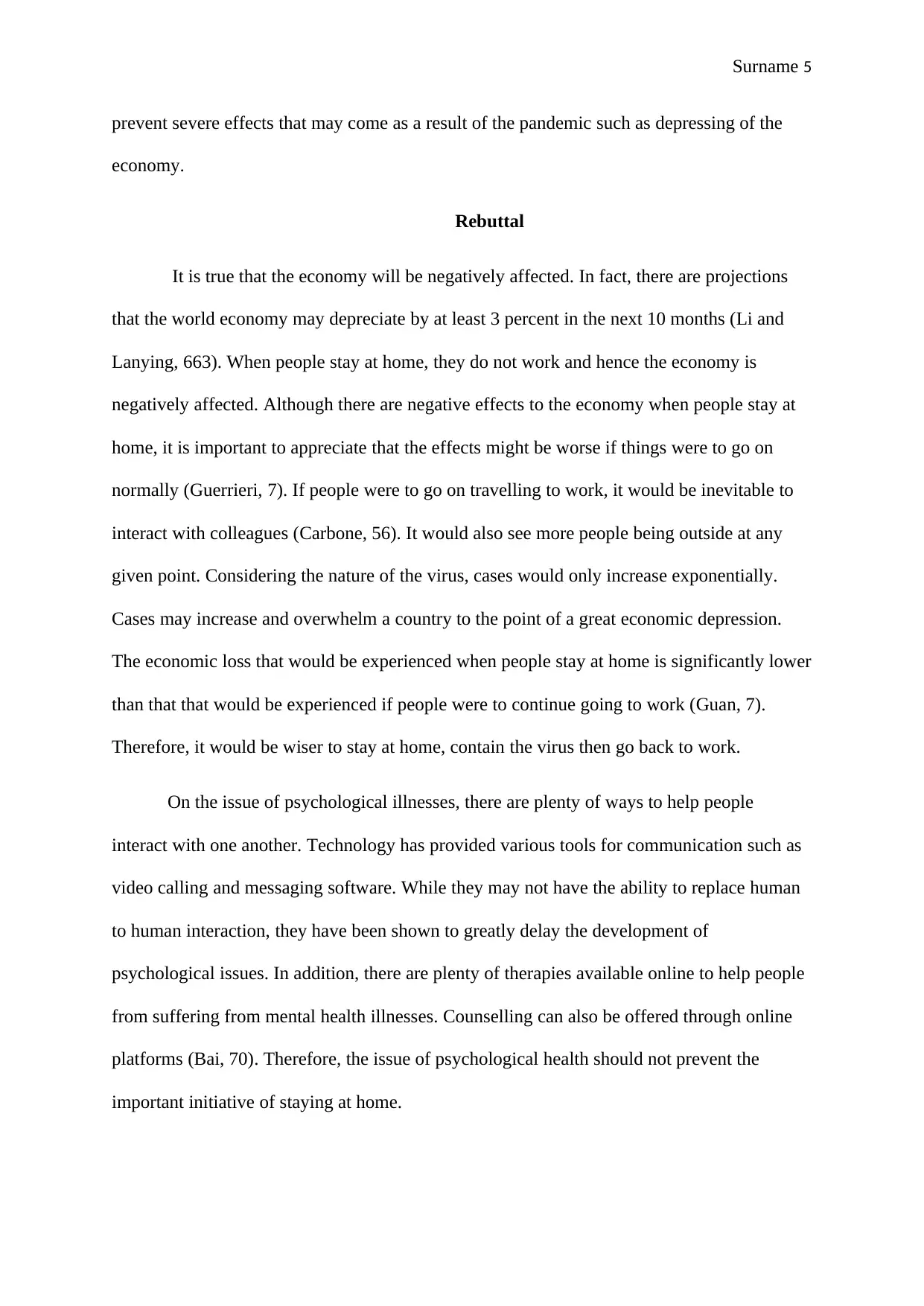
Surname 5
prevent severe effects that may come as a result of the pandemic such as depressing of the
economy.
Rebuttal
It is true that the economy will be negatively affected. In fact, there are projections
that the world economy may depreciate by at least 3 percent in the next 10 months (Li and
Lanying, 663). When people stay at home, they do not work and hence the economy is
negatively affected. Although there are negative effects to the economy when people stay at
home, it is important to appreciate that the effects might be worse if things were to go on
normally (Guerrieri, 7). If people were to go on travelling to work, it would be inevitable to
interact with colleagues (Carbone, 56). It would also see more people being outside at any
given point. Considering the nature of the virus, cases would only increase exponentially.
Cases may increase and overwhelm a country to the point of a great economic depression.
The economic loss that would be experienced when people stay at home is significantly lower
than that that would be experienced if people were to continue going to work (Guan, 7).
Therefore, it would be wiser to stay at home, contain the virus then go back to work.
On the issue of psychological illnesses, there are plenty of ways to help people
interact with one another. Technology has provided various tools for communication such as
video calling and messaging software. While they may not have the ability to replace human
to human interaction, they have been shown to greatly delay the development of
psychological issues. In addition, there are plenty of therapies available online to help people
from suffering from mental health illnesses. Counselling can also be offered through online
platforms (Bai, 70). Therefore, the issue of psychological health should not prevent the
important initiative of staying at home.
prevent severe effects that may come as a result of the pandemic such as depressing of the
economy.
Rebuttal
It is true that the economy will be negatively affected. In fact, there are projections
that the world economy may depreciate by at least 3 percent in the next 10 months (Li and
Lanying, 663). When people stay at home, they do not work and hence the economy is
negatively affected. Although there are negative effects to the economy when people stay at
home, it is important to appreciate that the effects might be worse if things were to go on
normally (Guerrieri, 7). If people were to go on travelling to work, it would be inevitable to
interact with colleagues (Carbone, 56). It would also see more people being outside at any
given point. Considering the nature of the virus, cases would only increase exponentially.
Cases may increase and overwhelm a country to the point of a great economic depression.
The economic loss that would be experienced when people stay at home is significantly lower
than that that would be experienced if people were to continue going to work (Guan, 7).
Therefore, it would be wiser to stay at home, contain the virus then go back to work.
On the issue of psychological illnesses, there are plenty of ways to help people
interact with one another. Technology has provided various tools for communication such as
video calling and messaging software. While they may not have the ability to replace human
to human interaction, they have been shown to greatly delay the development of
psychological issues. In addition, there are plenty of therapies available online to help people
from suffering from mental health illnesses. Counselling can also be offered through online
platforms (Bai, 70). Therefore, the issue of psychological health should not prevent the
important initiative of staying at home.
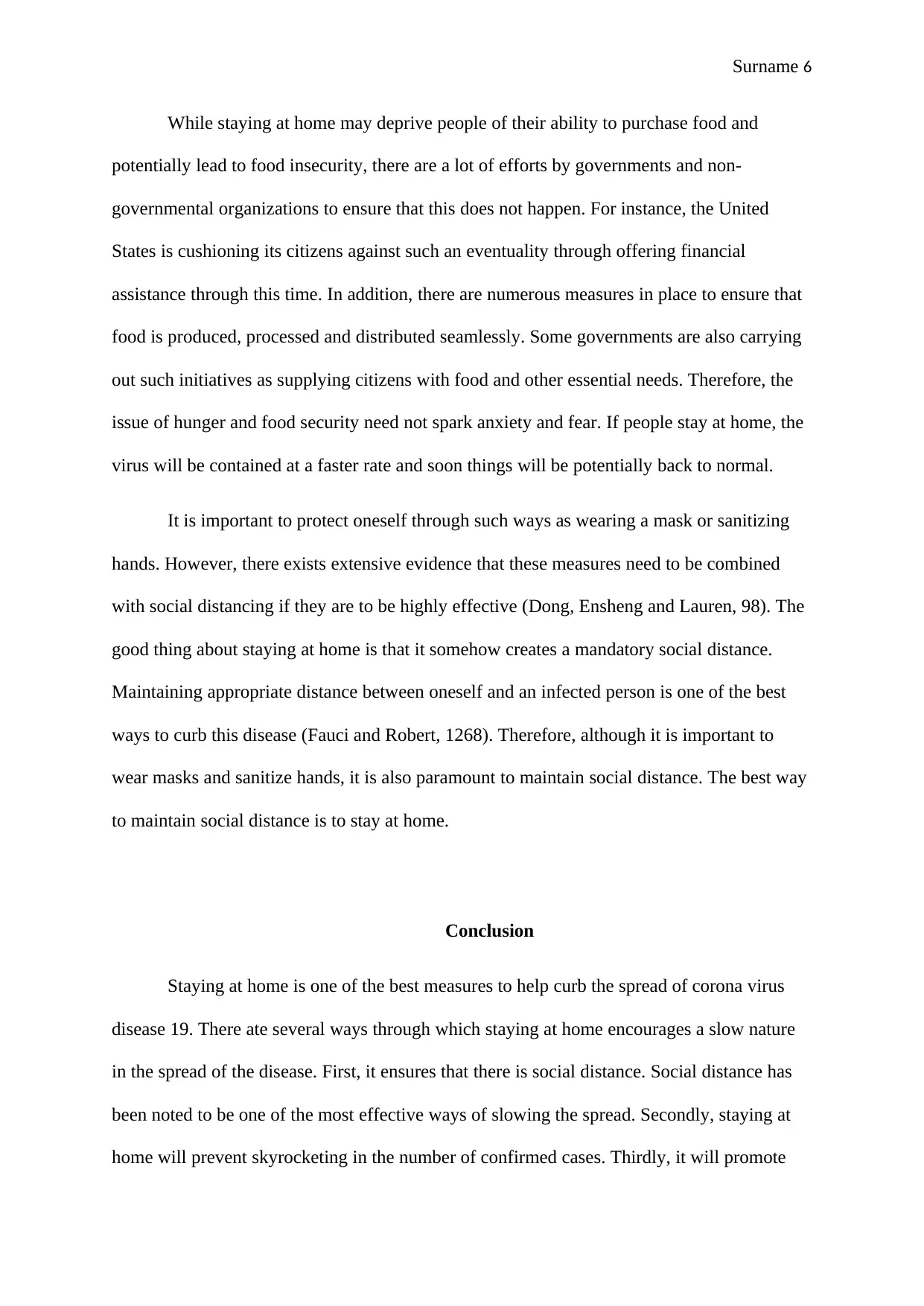
Surname 6
While staying at home may deprive people of their ability to purchase food and
potentially lead to food insecurity, there are a lot of efforts by governments and non-
governmental organizations to ensure that this does not happen. For instance, the United
States is cushioning its citizens against such an eventuality through offering financial
assistance through this time. In addition, there are numerous measures in place to ensure that
food is produced, processed and distributed seamlessly. Some governments are also carrying
out such initiatives as supplying citizens with food and other essential needs. Therefore, the
issue of hunger and food security need not spark anxiety and fear. If people stay at home, the
virus will be contained at a faster rate and soon things will be potentially back to normal.
It is important to protect oneself through such ways as wearing a mask or sanitizing
hands. However, there exists extensive evidence that these measures need to be combined
with social distancing if they are to be highly effective (Dong, Ensheng and Lauren, 98). The
good thing about staying at home is that it somehow creates a mandatory social distance.
Maintaining appropriate distance between oneself and an infected person is one of the best
ways to curb this disease (Fauci and Robert, 1268). Therefore, although it is important to
wear masks and sanitize hands, it is also paramount to maintain social distance. The best way
to maintain social distance is to stay at home.
Conclusion
Staying at home is one of the best measures to help curb the spread of corona virus
disease 19. There ate several ways through which staying at home encourages a slow nature
in the spread of the disease. First, it ensures that there is social distance. Social distance has
been noted to be one of the most effective ways of slowing the spread. Secondly, staying at
home will prevent skyrocketing in the number of confirmed cases. Thirdly, it will promote
While staying at home may deprive people of their ability to purchase food and
potentially lead to food insecurity, there are a lot of efforts by governments and non-
governmental organizations to ensure that this does not happen. For instance, the United
States is cushioning its citizens against such an eventuality through offering financial
assistance through this time. In addition, there are numerous measures in place to ensure that
food is produced, processed and distributed seamlessly. Some governments are also carrying
out such initiatives as supplying citizens with food and other essential needs. Therefore, the
issue of hunger and food security need not spark anxiety and fear. If people stay at home, the
virus will be contained at a faster rate and soon things will be potentially back to normal.
It is important to protect oneself through such ways as wearing a mask or sanitizing
hands. However, there exists extensive evidence that these measures need to be combined
with social distancing if they are to be highly effective (Dong, Ensheng and Lauren, 98). The
good thing about staying at home is that it somehow creates a mandatory social distance.
Maintaining appropriate distance between oneself and an infected person is one of the best
ways to curb this disease (Fauci and Robert, 1268). Therefore, although it is important to
wear masks and sanitize hands, it is also paramount to maintain social distance. The best way
to maintain social distance is to stay at home.
Conclusion
Staying at home is one of the best measures to help curb the spread of corona virus
disease 19. There ate several ways through which staying at home encourages a slow nature
in the spread of the disease. First, it ensures that there is social distance. Social distance has
been noted to be one of the most effective ways of slowing the spread. Secondly, staying at
home will prevent skyrocketing in the number of confirmed cases. Thirdly, it will promote
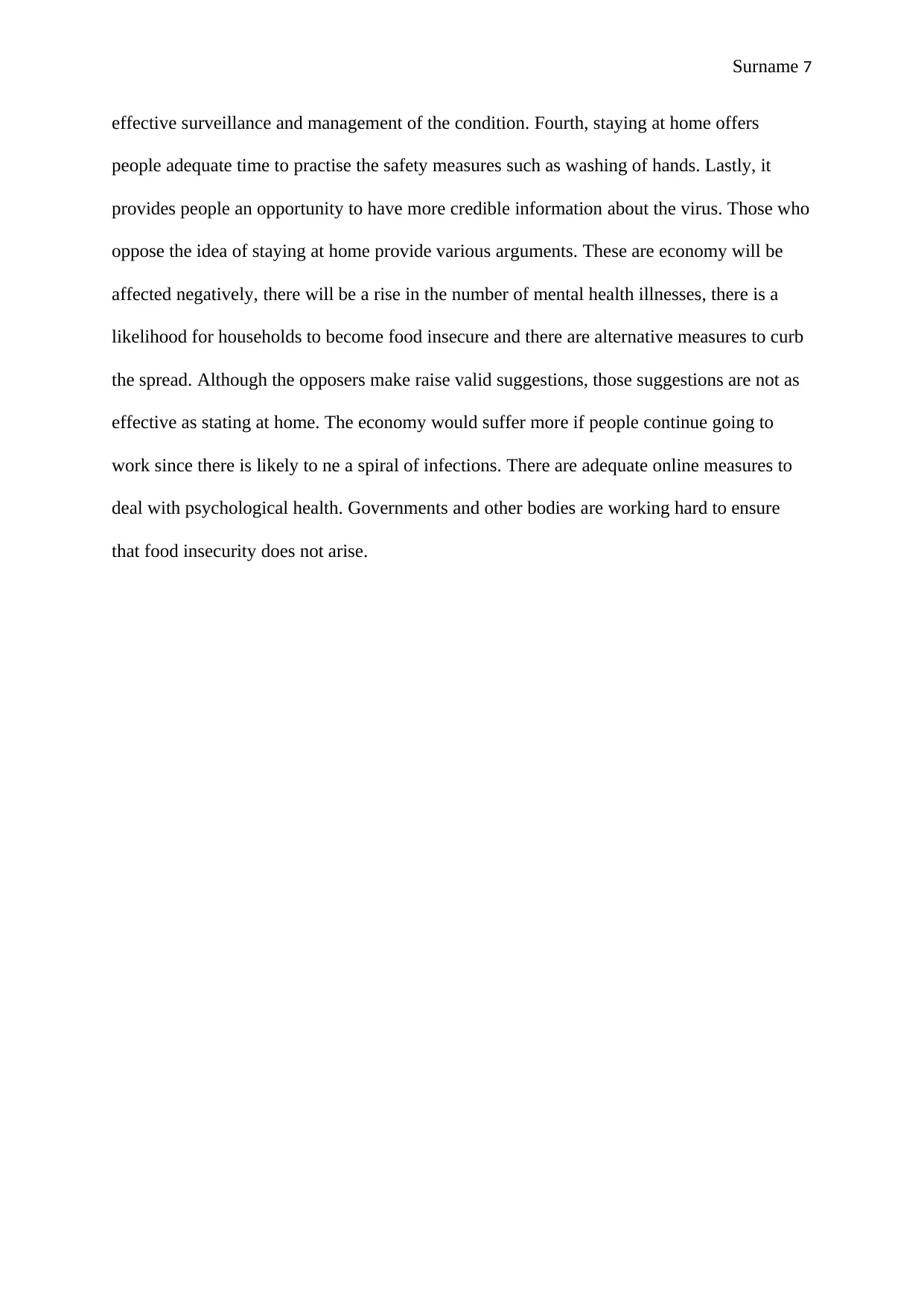
Surname 7
effective surveillance and management of the condition. Fourth, staying at home offers
people adequate time to practise the safety measures such as washing of hands. Lastly, it
provides people an opportunity to have more credible information about the virus. Those who
oppose the idea of staying at home provide various arguments. These are economy will be
affected negatively, there will be a rise in the number of mental health illnesses, there is a
likelihood for households to become food insecure and there are alternative measures to curb
the spread. Although the opposers make raise valid suggestions, those suggestions are not as
effective as stating at home. The economy would suffer more if people continue going to
work since there is likely to ne a spiral of infections. There are adequate online measures to
deal with psychological health. Governments and other bodies are working hard to ensure
that food insecurity does not arise.
effective surveillance and management of the condition. Fourth, staying at home offers
people adequate time to practise the safety measures such as washing of hands. Lastly, it
provides people an opportunity to have more credible information about the virus. Those who
oppose the idea of staying at home provide various arguments. These are economy will be
affected negatively, there will be a rise in the number of mental health illnesses, there is a
likelihood for households to become food insecure and there are alternative measures to curb
the spread. Although the opposers make raise valid suggestions, those suggestions are not as
effective as stating at home. The economy would suffer more if people continue going to
work since there is likely to ne a spiral of infections. There are adequate online measures to
deal with psychological health. Governments and other bodies are working hard to ensure
that food insecurity does not arise.
Paraphrase This Document
Need a fresh take? Get an instant paraphrase of this document with our AI Paraphraser
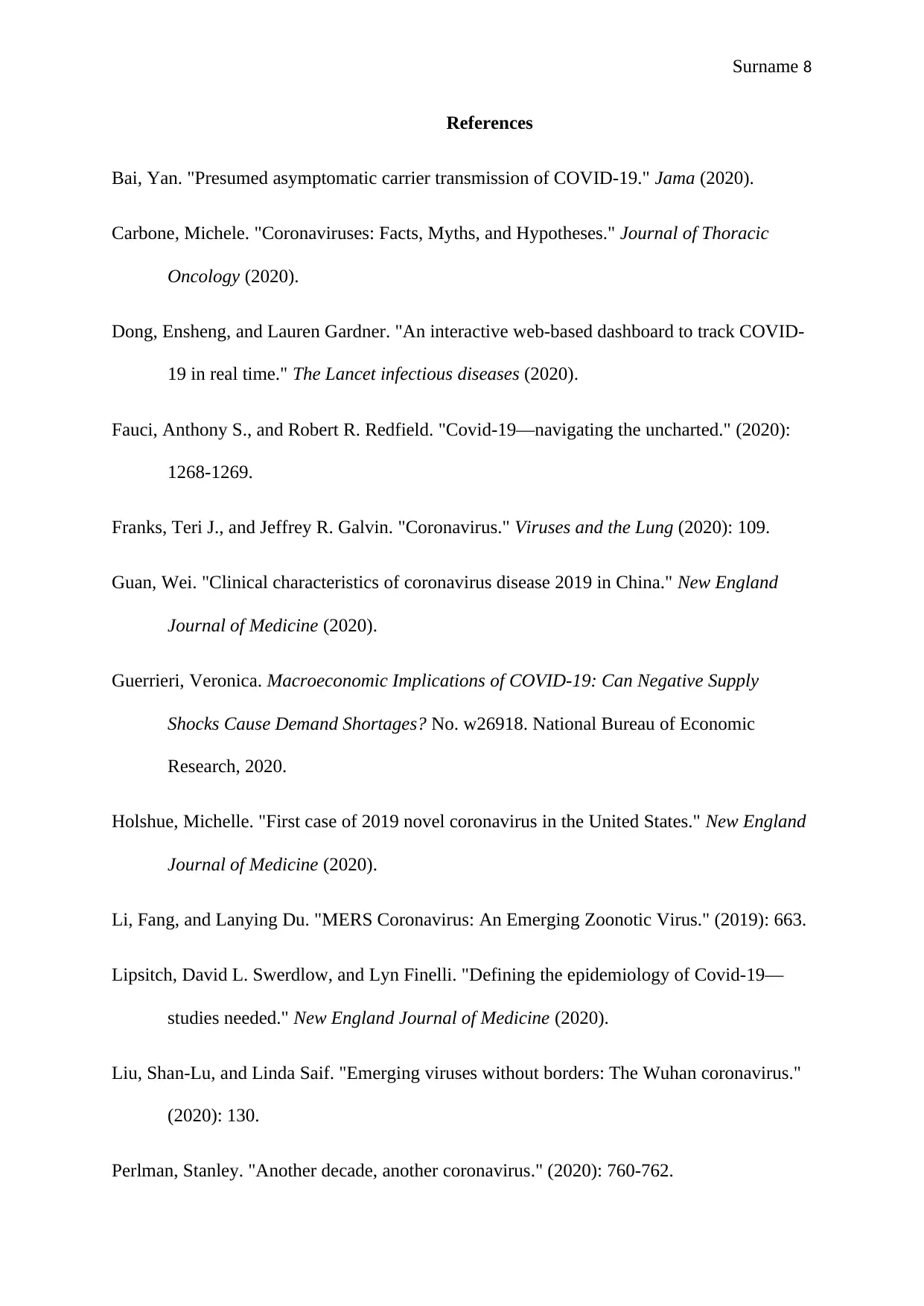
Surname 8
References
Bai, Yan. "Presumed asymptomatic carrier transmission of COVID-19." Jama (2020).
Carbone, Michele. "Coronaviruses: Facts, Myths, and Hypotheses." Journal of Thoracic
Oncology (2020).
Dong, Ensheng, and Lauren Gardner. "An interactive web-based dashboard to track COVID-
19 in real time." The Lancet infectious diseases (2020).
Fauci, Anthony S., and Robert R. Redfield. "Covid-19—navigating the uncharted." (2020):
1268-1269.
Franks, Teri J., and Jeffrey R. Galvin. "Coronavirus." Viruses and the Lung (2020): 109.
Guan, Wei. "Clinical characteristics of coronavirus disease 2019 in China." New England
Journal of Medicine (2020).
Guerrieri, Veronica. Macroeconomic Implications of COVID-19: Can Negative Supply
Shocks Cause Demand Shortages? No. w26918. National Bureau of Economic
Research, 2020.
Holshue, Michelle. "First case of 2019 novel coronavirus in the United States." New England
Journal of Medicine (2020).
Li, Fang, and Lanying Du. "MERS Coronavirus: An Emerging Zoonotic Virus." (2019): 663.
Lipsitch, David L. Swerdlow, and Lyn Finelli. "Defining the epidemiology of Covid-19—
studies needed." New England Journal of Medicine (2020).
Liu, Shan-Lu, and Linda Saif. "Emerging viruses without borders: The Wuhan coronavirus."
(2020): 130.
Perlman, Stanley. "Another decade, another coronavirus." (2020): 760-762.
References
Bai, Yan. "Presumed asymptomatic carrier transmission of COVID-19." Jama (2020).
Carbone, Michele. "Coronaviruses: Facts, Myths, and Hypotheses." Journal of Thoracic
Oncology (2020).
Dong, Ensheng, and Lauren Gardner. "An interactive web-based dashboard to track COVID-
19 in real time." The Lancet infectious diseases (2020).
Fauci, Anthony S., and Robert R. Redfield. "Covid-19—navigating the uncharted." (2020):
1268-1269.
Franks, Teri J., and Jeffrey R. Galvin. "Coronavirus." Viruses and the Lung (2020): 109.
Guan, Wei. "Clinical characteristics of coronavirus disease 2019 in China." New England
Journal of Medicine (2020).
Guerrieri, Veronica. Macroeconomic Implications of COVID-19: Can Negative Supply
Shocks Cause Demand Shortages? No. w26918. National Bureau of Economic
Research, 2020.
Holshue, Michelle. "First case of 2019 novel coronavirus in the United States." New England
Journal of Medicine (2020).
Li, Fang, and Lanying Du. "MERS Coronavirus: An Emerging Zoonotic Virus." (2019): 663.
Lipsitch, David L. Swerdlow, and Lyn Finelli. "Defining the epidemiology of Covid-19—
studies needed." New England Journal of Medicine (2020).
Liu, Shan-Lu, and Linda Saif. "Emerging viruses without borders: The Wuhan coronavirus."
(2020): 130.
Perlman, Stanley. "Another decade, another coronavirus." (2020): 760-762.
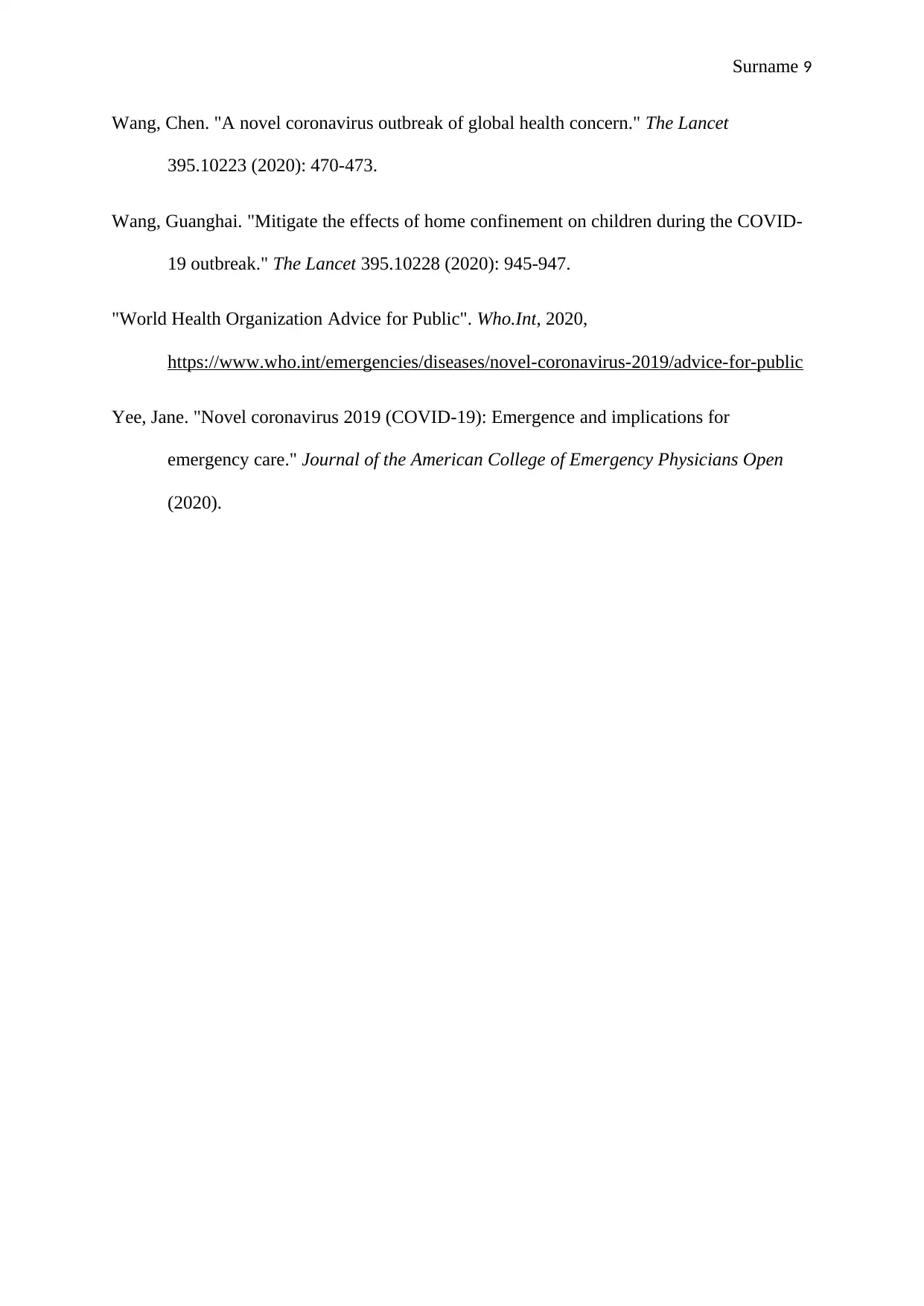
Surname 9
Wang, Chen. "A novel coronavirus outbreak of global health concern." The Lancet
395.10223 (2020): 470-473.
Wang, Guanghai. "Mitigate the effects of home confinement on children during the COVID-
19 outbreak." The Lancet 395.10228 (2020): 945-947.
"World Health Organization Advice for Public". Who.Int, 2020,
https://www.who.int/emergencies/diseases/novel-coronavirus-2019/advice-for-public
Yee, Jane. "Novel coronavirus 2019 (COVID‐19): Emergence and implications for
emergency care." Journal of the American College of Emergency Physicians Open
(2020).
Wang, Chen. "A novel coronavirus outbreak of global health concern." The Lancet
395.10223 (2020): 470-473.
Wang, Guanghai. "Mitigate the effects of home confinement on children during the COVID-
19 outbreak." The Lancet 395.10228 (2020): 945-947.
"World Health Organization Advice for Public". Who.Int, 2020,
https://www.who.int/emergencies/diseases/novel-coronavirus-2019/advice-for-public
Yee, Jane. "Novel coronavirus 2019 (COVID‐19): Emergence and implications for
emergency care." Journal of the American College of Emergency Physicians Open
(2020).
1 out of 9
Related Documents
Your All-in-One AI-Powered Toolkit for Academic Success.
+13062052269
info@desklib.com
Available 24*7 on WhatsApp / Email
![[object Object]](/_next/static/media/star-bottom.7253800d.svg)
Unlock your academic potential
© 2024 | Zucol Services PVT LTD | All rights reserved.




